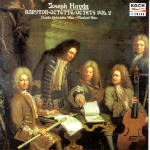The baryton is basically a turbo-charged, cello-sized member of the gamba family with lots of extra strings that vibrate sympathetically when the instrument is played normally, and which can also be plucked independently should the performer feel like living dangerously. A hopeless failure, historically speaking, the instrument was the favorite of Haydn’s first major patron, Prince Nikolaus Esterházy, who demanded that his musical servant compose zillions of pieces for it. Curiously, it isn’t so much the presence of the baryton that has prevented greater exposure for these delightful octets (the part can be played on any suitable stringed instrument of similar range), but rather the atrocious difficultly of the two horn parts. Haydn demands that his wind players execute insanely acrobatic figurations at both the extreme top and bottom of their range, and this extraordinary wind sonority gives these works much of their sonic allure. This second volume of Haydn’s complete baryton octets (the other participating instruments are two violins, viola, cello, and bass) has been a long time coming, and largely outclasses the very limited competition (on Ricercar). Manfred Huss directs genial, lively performances of music whose quality will surprise newcomers to this little known side of Haydn’s output. Definitely a disc that the composer’s fans have been waiting for.
































